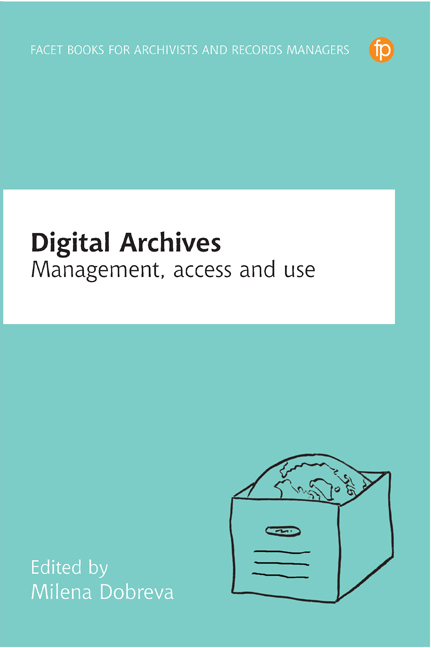Book contents
- Frontmatter
- Dedication
- Contents
- List of Figures and Tables
- Abbreviations
- Foreword
- Preface: Digital archives: management, use and access participatory approaches in archives
- Acknowledgements
- Notes on contributors
- PART I DRIVERS FOR MODERN DIGITAL ARCHIVES
- 1 Digital humanities and documentary mediations in the digital age
- 2 Managing turbulence
- 3 The political economy of digital cultural preservation
- 4 Legal issues surrounding digital archiving
- 5 Scientific information policies in the European context
- 6 Access to digital archives: studying users' expectations and behaviours
- PART II CASE STUDIES
- Afterword
- Index
5 - Scientific information policies in the European context
from PART I - DRIVERS FOR MODERN DIGITAL ARCHIVES
Published online by Cambridge University Press: 02 October 2019
- Frontmatter
- Dedication
- Contents
- List of Figures and Tables
- Abbreviations
- Foreword
- Preface: Digital archives: management, use and access participatory approaches in archives
- Acknowledgements
- Notes on contributors
- PART I DRIVERS FOR MODERN DIGITAL ARCHIVES
- 1 Digital humanities and documentary mediations in the digital age
- 2 Managing turbulence
- 3 The political economy of digital cultural preservation
- 4 Legal issues surrounding digital archiving
- 5 Scientific information policies in the European context
- 6 Access to digital archives: studying users' expectations and behaviours
- PART II CASE STUDIES
- Afterword
- Index
Summary
Introduction and background
The discourses on knowledge production and knowledge dis - semination have traditionally been dealt with separately, as referring to two different systems: the ‘science system’ and the ‘scholarly communication system’. Yet, this separation was even more reinforced by being the processes carried out by the two communities: scientists as knowledge production agents, information professionals as knowledge dissemination agents (Basili, 2009).
This same distinction applies also to policy issues and measures, conceived independently for scientific research from one side, and dissemination and access to scientific information from the other (Basili, 2010). Correspondingly, such a dichotomy reverberates throughout two basic threads of literature: one dealing with the ‘knowledge society’ (e.g. David and Foray, 2002; Sorlin and Vessuri, 2007) and one dealing with the ‘information society’ (e.g. EC, 1999; Webster, 2006).
In recent decades, such clear separation is largely blurred, as a consequence of techno-economic forces and factors affecting knowledge dissemination, primarily the internet and the entrepreneurial climate in research and development. To summarise in a nutshell, the two discourses on the information society and knowledge society can be interpreted and analysed as converging towards the discourse on the ‘knowledge economy’, with major policy implications for scientific information, since, at the same time, an economic logic increasingly enters into the domain of knowledge dissemination.
This interdependent connection appears evident in the policy documents from the European Commission and the European Parliament released since the Lisbon Council of March 2000, and effectively expressed in European Commission COM(2012) 392 final: ‘Knowledge is the currency of the new economy’ (EC, 2012a).
Focusing the attention on economic pressures more than on technological opportunities, in this chapter a short account will be given on how the transformation from academic science to entrepreneurial science has been theorised in the research policy literature.
Theoretical literature about research policy is abundant and multifaceted, nevertheless, reference here is made to the concepts ‘Mertonian norms’, ‘mode 2 knowledge production model’ and ‘Triple Helix’, which have a significant impact on the rationale of this chapter.
- Type
- Chapter
- Information
- Digital ArchivesManagement, use and access, pp. 97 - 120Publisher: FacetPrint publication year: 2018

